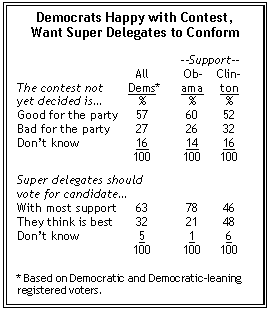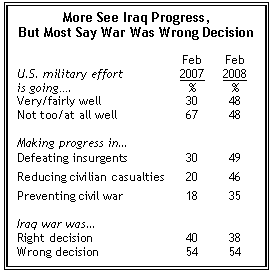Summary of Findings

Barack Obama is riding high as the March 4 primaries approach. Obama has moved out to a broad-based advantage over Hillary Clinton in the national Democratic primary contest and holds a 50%-43% lead over John McCain in a general election matchup.
However, the survey results point to several potential hazards for Obama. A solid majority of voters (56%) says Obama has not provided enough information about his plans and policies; in contrast, most voters say Clinton and McCain have disclosed enough information about their plans. Moreover, a plurality of voters (43%) says that Obama would not be “tough enough” in dealing with foreign policy and national security issues.
The latest survey by the Pew Research Center for the People & the Press, conducted Feb. 20-24 among 1,508 adults, also finds signs of trouble for the GOP’s frontrunner. Even as there are indications McCain is consolidating his support within the Republican base, nearly half of conservative Republicans (46%) say his positions on the issues are not conservative enough. McCain’s image among independent voters has slipped since early February, and currently Obama edges McCain by 49% to 43% among independents in a general election matchup.

However, public attitudes about the war in Iraq have turned more positive, which is a favorable development for McCain. A steadily growing number of Americans say progress is being made in Iraq. Moreover, 47% now favor keeping U.S. troops in Iraq until the situation there has stabilized, the highest percentage expressing this view in well more than a year.
Perceptions of how things are going in Iraq are strongly correlated with support for McCain, among Republicans, Democrats and independents. For example, in a matchup against Barack Obama, McCain does 31 points better among independents who believe the war is going well than among those who think it is not going well.
Hillary Clinton’s support levels have slipped across the board among Democrats. Clinton leads Obama only among white women voters, those ages 65 and older, and voters with household incomes of less than $30,000 a year. In addition, overcoming voters’ perceptions of Obama’s momentum is a major challenge for Clinton. Fully 70% of Democratic voters — including 52% of those who support Clinton — say that Obama is most likely to win the Democratic presidential nomination.

Nonetheless, Clinton fares nearly as well as Obama in a head-to-head matchup with McCain, however. The New York senator runs better than Obama among self-described Democrats in the general election test, although Obama fares better than Clinton among independents.
Democratic Base Fissures
Although attention has been focused on McCain’s problems with the GOP base, there are indications that some Democrats might defect if Obama is the party’s nominee. Overall, 20% of white Democratic voters say they would vote for McCain if Obama is the Democratic nominee. That is twice the percentage of white Democrats who say they would support McCain in a Clinton-McCain matchup. Older Democrats (ages 65 and older), lower-income and less educated Democrats also would support McCain at higher levels if Obama rather than Clinton is the party’s nominee.

The three leading presidential candidates have divergent images, which are reflected in the words that voters use to describe Obama, Clinton and McCain. In general, the single words used to describe Obama are very positive, but the word “inexperienced” is used most frequently to describe the Illinois senator.
“Experienced” is the word used most often to describe Clinton, with the words “strong” and untrustworthy” also mentioned frequently. For McCain, the word “old” is used most often as a descriptor, far outnumbering mentions of “honest,” “experienced” and “patriot.”
Nearly a third of all voters (32%) believe that, at 71 years old, McCain is too old to be president, while 66% say that being 71 does not make him too old. Opinions about whether McCain is too old to be president are comparable with views about Bob Dole during the 1996 campaign. In March 1996, 34% said Dole, who would have been 73 upon inauguration, was too old, while 63% said he was not.

Despite McCain having nearly secured the Republican nomination, freeing him to focus on the general election, most Democrats say the extended contest between Obama and Clinton has been good for the party. Nearly six-in-ten Democratic voters (57%) say the fact that the primary contest is not yet decided is a good thing for the Democratic Party.
There also is broad agreement among Democrats that if neither Obama nor Clinton wins enough support to gain the nomination, the party’s super delegates should support the candidate who has won the most support, rather than the one they personally think is best.
By roughly two-to-one (63% to 32%), more Democratic voters say the super delegates — primarily current and former elected officials and members of the Democratic National Committee — should vote for the candidate who was won the most support in caucuses and primaries. Far more Obama supporters than Clinton supporters say that super delegates should back the candidate who has won the most support during the primaries (78% vs. 46%).
Improvement in Iraq
The survey finds a marked improvement in perceptions of the situation in Iraq over the past year. As was the case in November, as many people say the military effort there is going well as say it is not going well (48% each). A year ago, negative perceptions of the situation in Iraq outnumbered positive assessments by greater than two-to-one (67% to 30%).

Opinions about progress toward specific objectives, such as defeating the insurgents and reducing civilian casualties, also have become much more positive. In addition, the proportion saying the United States is making progress in preventing a civil war in Iraq has approximately doubled in the past year (from 18% to 35%), though a greater percentage (49%) still says the United States is losing ground in preventing civil war.
Despite the more positive outlook, the balance of opinion about the decision to take military action in Iraq is about the same now as it was a year ago. A majority (54%) says the war was the wrong decision, while 38% say it was the right decision. The balance of opinion on whether the war was right is nearly identical to what it was in February 2007 (54% wrong vs. 40% right).
Democrats hold a significant advantage as the party better able to handle Iraq, and have even larger leads on nearly every other issue. By 47%-37%, more people say the Democratic Party rather than the Republican Party is better able to make wise decisions about Iraq. Notably, a majority (53%) also says the Democrats are better able to handle the economy, which has become the leading issue in the presidential campaign. Terrorism is the only issue on which the Republican Party holds even a modest lead (45% to 38%); however, its advantage on dealing with the terrorist threat was approximately twice as great during the 2004 campaign.
In this regard, the poll finds a majority of the public giving the Bush administration credit for preventing another terrorist attack on the U.S. in recent years. More than six-in-ten Americans say the policies and actions Bush has pursued have had a great deal (28%) or fair amount (34%) to do with keeping America safe.


